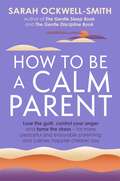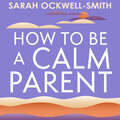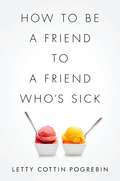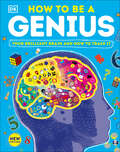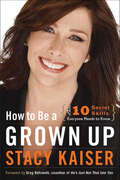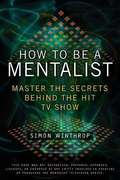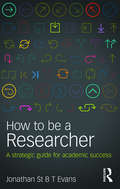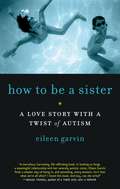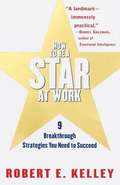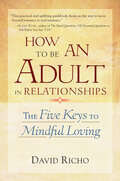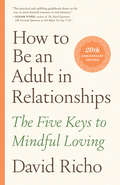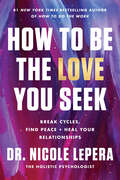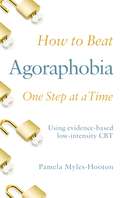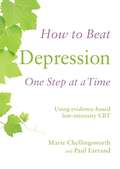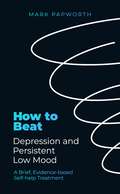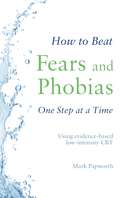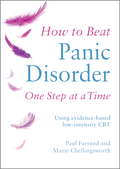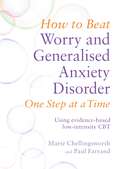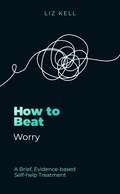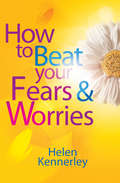- Table View
- List View
How to Be a Calm Parent: Lose the guilt, control your anger and tame the stress - for more peaceful and enjoyable parenting and calmer, happier children too
by Sarah Ockwell-SmithAn indispensable guide to more peaceful and enjoyable parenting'This isn't a parenting advice book, it's a book about you. The words you read in this book, however, will have a far greater impact on your children, than those contained in any parenting book you could read (and I count my own in that too).'How many times have you asked yourself 'what's wrong with me? Why can't I stay calm?'. So many of us would love to follow a gentler, more positive style of parenting, but we don't think we're cut out for it, because we aren't naturally calm. We feel that there is something wrong with us, that we're not good enough. We believe we are failing our children by not controlling our own emotions adequately.What we don't realise is that this describes almost every parent there ever was - and ever will be.In her trademark gentle, supportive and reassuring style, bestselling author Sarah Ockwell-Smith shows that while we all lose it at times, everyone can become a calmer parent. Based on her many years' experience working with parents, Sarah provides research, advice and practical exercises that will set you on the path to calmer parenting that will benefit both you and your child.Covering everything from the impact of your own upbringing on your parenting style to work and home life balance and letting go of the quest for perfection to ensuring your own basic needs are met, How to Be a Calm Parent is for any parent who knows that they need to be calmer to raise well adjusted, happy children, but struggles with their own emotions and stress levels.
How to Be a Calm Parent: Lose the guilt, control your anger and tame the stress - for more peaceful and enjoyable parenting and calmer, happier children too
by Sarah Ockwell-SmithAn indispensable guide to more peaceful and enjoyable parenting'This isn't a parenting advice book, it's a book about you. The words you read in this book, however, will have a far greater impact on your children, than those contained in any parenting book you could read (and I count my own in that too).'How many times have you asked yourself 'what's wrong with me? Why can't I stay calm?'. So many of us would love to follow a gentler, more positive style of parenting, but we don't think we're cut out for it, because we aren't naturally calm. We feel that there is something wrong with us, that we're not good enough. We believe we are failing our children by not controlling our own emotions adequately.What we don't realise is that this describes almost every parent there ever was - and ever will be.In her trademark gentle, supportive and reassuring style, bestselling author Sarah Ockwell-Smith shows that while we all lose it at times, everyone can become a calmer parent. Based on her many years' experience working with parents, Sarah provides research, advice and practical exercises that will set you on the path to calmer parenting that will benefit both you and your child.Covering everything from the impact of your own upbringing on your parenting style to work and home life balance and letting go of the quest for perfection to ensuring your own basic needs are met, How to Be a Calm Parent is for any parent who knows that they need to be calmer to raise well adjusted, happy children, but struggles with their own emotions and stress levels.
How to Be a Friend to a Friend Who's Sick
by Letty Cottin PogrebinEveryone knows someone whoOCOs sick or suffering. Yet when a friend or relative is under duress many of us feel uncertain about how to cope. Throughout her recent bout with breast cancer, Letty Cottin Pogrebin became fascinated by her friendsOCO and familyOCOs diverse reactions to her and her illness: how awkwardly some of them behaved; how some misspoke or misinterpreted her needs; and how wonderful it was when people read her right. She began talking to her fellow patients and dozens of other veterans of serious illness, seeking to discover what sick people wished their friends knew about how best to comfort, help, and even simply talk to them. Now Pogrebin has distilled their collective stories and opinions into this wide-ranging compendium of pragmatic guidance and usable wisdom. Her advice is always infused with sensitivity, warmth, and humor. It is embedded in candid stories from her own and othersOCO journeys, and their sometimes imperfect interactions with well-meaning friends. "How to Be a Friend to a Friend WhoOCOs Sick" is an invaluable guidebook for anyone hoping to rise to the challenges of this most important and demanding passage of friendship.
How to Be a Genius: Your Brilliant Brain and How to Train It (DK Train Your Brain)
by DKUse your eyes, ears, and imagination to explore your amazing mind and sharpen your wits. Do you want to calculate like Einstein, paint like Picasso, or compose like Mozart? Put your gray matter to the brain-training test and see how you measure up to some of the greatest thinkers in history. Tackle mind-boggling puzzles, games, and optical illusions and discover what makes your brain work: from why you smile to what is going on inside your head and what side of your brain does what. Learn about neurons, how memory works, and how to boost your creativity.How to Be a Genius makes a complex subject fun, accessible, and exciting, and is perfect for any child, whether they are intent on becoming a genius or just want to have fun with clever activities at home, on a journey, or in school.
How to Be a Grown Up: The 10 Secret Skills Everyone Needs to Know
by Stacy KaiserAre you pleased with the progress you've made so far in achieving your hopes and dreams? Are you excited about what's coming next in your life? Or do you need a complete overhaul?In How to Be a Grown Up, renowned psychotherapist Stacy Kaiser demonstrates the life-changing benefits of embracing the concept of the "fully loaded grown up." After counseling thousands of patients, she has identified ten critical areas that determine success, happiness, and fulfillment—from conscientious money management to developing strong coping skills to building the right kind of friendships and intimate partnerships.How to Be a Grown Up begins with "The Quiz," the first step to empowering you by helping you become an expert on your own life, exploring what you really want and need in every area of life. In chapters packed full of tips, tools, and exercises, Stacy takes you on a journey of self-discovery in which you evaluate your individual strengths and weaknesses as well as identify self-sabotaging traits and learn how to change them once and for all. Had trouble keeping your cool the last time you talked to your mom? Read up on the secrets of dynamic communicators. Reevaluating your circle of friends? Discover the six types of grown-up friendships and appreciate your relationships for what they are. Stuck on a frustrating rung of the corporate ladder? Learn the traits that every employer loves—and how to master them yourself.Fully loaded grown ups are fully empowered and in charge of their own lives. They are able to initiate change instead of just reacting to events, bounce back from setbacks and disappointments, and enjoy more satisfying relationships—with everyone, including themselves. Most important, fully loaded grown ups enjoy true freedom—not the kind envisioned as a child, meaning eating ice cream for dinner, but absolute confidence in their ability to live their own best life.With her trademark mix of warmth and toughness, Stacy motivates readers to rally their strengths, let go of childish, outgrown attachments, and arrive at a peaceful balance between freedom and responsibility. Whether you feel you've lost control of your life or you just need a tune-up in an area or two, How to Be a Grown Up is a wise and witty life guide for the twenty-first century.
How to Be a Mentalist
by Simon WinthropA renowned stage magician reveals the secrets of The Mentalist's brainpower. On the hit television show The Mentalist, protagonist Patrick Jane employs his keen powers of observation and mental acuity to assist the police. Now, noted stage magician Simon Winthrop explains How to Be a Mentalist by revealing how Jane comes to his startlingly accurate conclusions- and also asserts that it's possible for anyone to bring similar skills to bear in their everyday life. Featuring intellectual and physical exercises, readers will learn how to reach their fullest mental potential by enhancing memory, developing observational abilities, using persuasion, and much more.
How to Be a Researcher: A strategic guide for academic success
by Jonathan St EvansHow to be a Researcher provides a strategic guide to the conduct of a successful research career within a university environment. Based on the author’s extensive personal experience, it offers down-to-earth advice, philosophical guidance, and discussions of the political context of academic research. This is not a research methods book, and the topics it covers are rarely discussed elsewhere. The bulk of the book provides practical advice on the development of essential skills and strategic approaches, covering questions such as: how to decide which topics to work on how to read and review literature how to develop theory how to integrate research and teaching activity how to approach research design how to obtain and manage research funding how to collaborate and supervise effectively how to write up your research, and how to secure the best sources of publication. The final part of the book considers the philosophy and psychology of research work and includes an exploration of the cognitive biases which may affect researchers. How to be a Researcher will be particularly useful for masters and doctoral students in the behavioral and social sciences, and also for early career academics developing research within a university career.
How to Be a Sister: A Love Story with a Twist of Autism
by Eileen GarvinEileen Garvin's older sister, Margaret, was diagnosed with severe autism at age three causing awkward, hilarious, and heartbreaking situations. What is she going to do about Margaret? Will she remain in Margaret's life, or walk away? How to Be a Sister will speak to siblings, parents, friends, and teachers of people with autism and to anyone who sometimes struggles to connect with someone difficult or different.
How to Be a Star at Work: 9 Breakthrough Strategies You Need to Succeed
by Robert E. Kelley"Do you know what it takes to be a star at work? Robert Kelley has the answer. " --Fast Company STARS ARE MADE, NOT BORN Find out what separates stars from average performers Learn how to be the top pick for the choice jobs Use nine star-performer strategies to become a member of the select "ten-for-one" club, with ten times the productivity of the average worker Find out how using the nine strategies enables you to out-perform people with supposedly better credentials New in this edition: special insights for women and members of minority groups
How to Be an Adult in Relationships: The Five Keys to Mindful Loving
by David Richo"Most people think of love as a feeling," says David Richo, "but love is not so much a feeling as a way of being present." In this book, Richo offers a fresh perspective on love and relationships--one that focuses not on finding an ideal mate, but on becoming a more loving and realistic person. Drawing on the Buddhist concept of mindfulness, How to Be an Adult in Relationships explores five hallmarks of mindful loving and how they play a key role in our relationships throughout life: 1. Attention to the present moment; observing, listening, and noticing all the feelings at play in our relationships. 2. Acceptance of ourselves and others just as we are. 3. Appreciation of all our gifts, our limits, our longings, and our poignant human predicament. 4. Affection shown through holding and touching in respectful ways. 5. Allowing life and love to be just as they are, with all their ecstasy and ache, without trying to take control.When deeply understood and applied, these five simple concepts--what Richo calls the five A's--form the basis of mature love. They help us to move away from judgment, fear, and blame to a position of openness, compassion, and realism about life and relationships. By giving and receiving these five A's, relationships become deeper and more meaningful, and they become a ground for personal transformation." David Richo, PhD, is a psychotherapist, teacher, writer, and workshop leader whose work emphasizes the benefits of mindfulness and loving-kindness in personal growth and emotional well-being. He is the author of numerous books, including How to Be an Adult in Relationships and The Five Things We Cannot Change. He lives in Santa Barbara and San Francisco, California. ""Well-constructed and thought-provoking."--Spirituality & Health "An inspiring and highly practical guide to effective relationships."--Kathlyn Hendricks, coauthor of Conscious Loving and The Conscious Heart
How to Be an Adult in Relationships: The Five Keys to Mindful Loving
by David Richo"Most people think of love as a feeling," says David Richo, "but love is not so much a feeling as a way of being present." In this book, Richo offers a fresh perspective on love and relationships—one that focuses not on finding an ideal mate, but on becoming a more loving and realistic person. Drawing on the Buddhist concept of mindfulness, How to Be an Adult in Relationships explores five hallmarks of mindful loving and how they play a key role in our relationships throughout life: 1. Attention to the present moment; observing, listening, and noticing all the feelings at play in our relationships. 2. Acceptance of ourselves and others just as we are. 3. Appreciation of all our gifts, our limits, our longings, and our poignant human predicament. 4. Affection shown through holding and touching in respectful ways. 5. Allowing life and love to be just as they are, with all their ecstasy and ache, without trying to take control. When deeply understood and applied, these five simple concepts—what Richo calls the five A's—form the basis of mature love. They help us to move away from judgment, fear, and blame to a position of openness, compassion, and realism about life and relationships. By giving and receiving these five A's, relationships become deeper and more meaningful, and they become a ground for personal transformation.
How to Be the Love You Seek: Break Cycles, Find Peace, and Heal Your Relationships
by Dr. Nicole LePera"A practical, reader-friendly, and inspiring primer on how to extend true connection and love to others.” —Gabor Maté M.D., New York Times bestselling author of The Myth of NormalFrom the author of the #1 New York Times bestseller How to Do the Work comes this paradigm-shifting guide to healing your relationships, beginning with the one you have with yourself.Relationships have always been essential to human survival. Our bodies and brains are programmed to seek out connection, whether familial, romantic, or platonic. And yet, these vital bonds are often at the root of our deepest suffering. While our hearts are primed for compassionate connection, our nervous systems—which store all our past hurts and disappointments—are wired for threat and negativity.For decades, leading relationship advice has maintained that successful relationships require a specific compromise—that we must change our authentic expression to better meet the needs of others, and vice versa. It may sound reasonable in theory, but as Dr. LePera explains, this approach is nothing less than a recipe for a lifetime of resentment.In How to Be the Love You Seek, #1 New York Times bestselling author Dr. LePera—whose integrative, holistic approach to psychology has attracted an international audience of millions—offers a new path to healing our relationships. Harnessing the latest scientific research, she teaches us to recognize how unmet needs from our earliest relationships create our current, dysfunctional relationship patterns, and leave us in a state of constant internal threat, even with those closest to us.This book, the last in her “How To” trilogy, illuminates the way out of trauma bonds and into relationships rooted in mutual respect and compassion. In it, you will learn how to create safety in your own body and mind; identify your unmet needs; develop emotional resilience; cultivate heart coherence to build deep emotional connections with others; and maintain healthy interdependence in our communities.Whether you struggle to maintain the kinds of relationships you want, or are facing a specific challenge with a spouse, partner, parent, sibling, child, friend, or colleague—Dr. LePera teaches us how to break painful cycles and reconnect with the wisdom, appreciation, and compassion that lives in each of our hearts. It is our heart’s innate capacity to love that is the true source of all healing. When we tap into that power, we can become the love we seek.Complete with stories, exercises, journal prompts, and other practical tools, How to Be the Love You Seek offers a healing roadmap for all generations of cycle-breakers.
How to Beat Agoraphobia One Step at a Time: Using evidence-based low-intensity CBT
by Pamela Myles-HootonThis book is the perfect resource for helping you beat agoraphobia, either by yourself or in conjunction with the support of a family member or a healthcare professional. It is written in a friendly, engaging and jargon-free style and encourages interactive reading through tables, illustrations and worksheets. It also has some handy top tips on how to deal with any setbacks along the way. Real-life case studies illustrate the use of each intervention and demonstrate how you can gradually increase your tolerance for the situations that you fear and avoid. This book is designed to help you understand your agoraphobia and learn techniques so that you can unlock the door to reclaiming your freedom. This series of self-help books follows a 'low intensity cognitive behavioural therapy' (LICBT) approach which is frequently the first choice treatment for depression and some anxiety disorders like agoraphobia because of its strong evidence base. The series is written by authors with considerable experience in the field of LICBT self-help research, training and clinical practice.
How to Beat Agoraphobia One Step at a Time: Using evidence-based low-intensity CBT (How To Beat #11)
by Pamela Myles-HootonThis book is the perfect resource for helping you beat agoraphobia, either by yourself or in conjunction with the support of a family member or a healthcare professional. It is written in a friendly, engaging and jargon-free style and encourages interactive reading through tables, illustrations and worksheets. It also has some handy top tips on how to deal with any setbacks along the way. Real-life case studies illustrate the use of each intervention and demonstrate how you can gradually increase your tolerance for the situations that you fear and avoid. This book is designed to help you understand your agoraphobia and learn techniques so that you can unlock the door to reclaiming your freedom. This series of self-help books follows a 'low intensity cognitive behavioural therapy' (LICBT) approach which is frequently the first choice treatment for depression and some anxiety disorders like agoraphobia because of its strong evidence base. The series is written by authors with considerable experience in the field of LICBT self-help research, training and clinical practice.
How to Beat Depression One Step at a Time: Using evidence-based low-intensity CBT (How To Beat #2)
by Paul Farrand Marie ChellingsworthThe IAPT programme, initiated in 2008, offers both high-intensity and low-intensity therapy. There are currently no self-help materials catering for low-intensity patients. This is the first in a new series of short self-help books for low intensity patients, covering topics such as OCD; generalised anxiety; and panic and agoraphobia. The government continues to invest in IAPT, with the focus shifting towards having more low-intensity workers. Based upon an evidence based cognitive behavioural therapy approach, this book is written in a friendly, engaging (and jargon-free!) style and encourages interactive reading through tables, illustrations and worksheets. Real life case studies illustrate the use of each intervention and demonstrate how a patient can work through an issue.
How to Beat Depression One Step at a Time: Using evidence-based low-intensity CBT (How To Beat Ser.)
by Paul Farrand Marie ChellingsworthThe IAPT programme, initiated in 2008, offers both high-intensity and low-intensity therapy. There are currently no self-help materials catering for low-intensity patients. This is the first in a new series of short self-help books for low intensity patients, covering topics such as OCD; generalised anxiety; and panic and agoraphobia. The government continues to invest in IAPT, with the focus shifting towards having more low-intensity workers. Based upon an evidence based cognitive behavioural therapy approach, this book is written in a friendly, engaging (and jargon-free!) style and encourages interactive reading through tables, illustrations and worksheets. Real life case studies illustrate the use of each intervention and demonstrate how a patient can work through an issue.
How to Beat Depression and Persistent Low Mood: A Brief, Evidence-based Self-help Treatment (How To Beat #12)
by Mark PapworthThis book will help you to both understand your depression and treat it effectively through a brief psychological intervention known as behavioural activation therapy. Written in a friendly, engaging (and jargon-free!) style, this self-help guide encourages interactive reading through tables, illustrations and worksheets. Case studies illustrate the use of the therapy and demonstrate how you can gradually overcome your condition.The How to Beat series of books has emerged from recent, revolutionary healthcare service innovations which have made effective psychological treatments available to more people than ever before. The books are designed to allow those who experience common mental health problems to either help themselves to recover or get the best possible benefit out of their contact with health professionals. They contain easy to understand treatments drawn from cognitive behavioural therapy (CBT) which is recommended by the scientific evidence. They are written by authors with considerable experience in the field of CBT training, research and clinical practice.
How to Beat Depression and Persistent Low Mood: A Brief, Evidence-based Self-help Treatment (How To Beat #12)
by Mark PapworthThis book will help you to both understand your depression and treat it effectively through a brief psychological intervention known as behavioural activation therapy. Written in a friendly, engaging (and jargon-free!) style, this self-help guide encourages interactive reading through tables, illustrations and worksheets. Case studies illustrate the use of the therapy and demonstrate how you can gradually overcome your condition.The How to Beat series of books has emerged from recent, revolutionary healthcare service innovations which have made effective psychological treatments available to more people than ever before. The books are designed to allow those who experience common mental health problems to either help themselves to recover or get the best possible benefit out of their contact with health professionals. They contain easy to understand treatments drawn from cognitive behavioural therapy (CBT) which is recommended by the scientific evidence. They are written by authors with considerable experience in the field of CBT training, research and clinical practice.
How to Beat Fears and Phobias One Step at a Time: Using evidence-based low-intensity CBT
by Mark PapworthImproving Access to Psychological Therapies (IAPT), initiated in 2008, has made psychological therapy more accessible to those in need. This series of self-help titles is the first to be created specifically for low-intensity IAPT, and all titles follow an evidence-based cognitive behavioural therapy (CBT) approach which is the treatment of choice for depression and anxiety disorders. They are written by authors with considerable experience in the field of CBT self-help research, training and clinical practice.This book is the perfect resource for helping you beat fears and phobias, either by yourself or in conjunction with the support of an IAPT service. It is written in a friendly, engaging (and jargon-free!) style and encourages interactive reading through tables, illustrations and worksheets. Real-life case studies illustrate the use of the therapy and demonstrate how you can gradually overcome your fear of the thing that frightens you. This book will help you to understand your phobia and face your fears through graded exposure therapy.
How to Beat Fears and Phobias One Step at a Time: Using evidence-based low-intensity CBT (How To Beat #10)
by Mark PapworthImproving Access to Psychological Therapies (IAPT), initiated in 2008, has made psychological therapy more accessible to those in need. This series of self-help titles is the first to be created specifically for low-intensity IAPT, and all titles follow an evidence-based cognitive behavioural therapy (CBT) approach which is the treatment of choice for depression and anxiety disorders. They are written by authors with considerable experience in the field of CBT self-help research, training and clinical practice.This book is the perfect resource for helping you beat fears and phobias, either by yourself or in conjunction with the support of an IAPT service. It is written in a friendly, engaging (and jargon-free!) style and encourages interactive reading through tables, illustrations and worksheets. Real-life case studies illustrate the use of the therapy and demonstrate how you can gradually overcome your fear of the thing that frightens you. This book will help you to understand your phobia and face your fears through graded exposure therapy.
How to Beat Panic Disorder One Step at a Time: Using evidence-based low-intensity CBT (How To Beat #3)
by Paul Farrand Marie ChellingsworthHow to Beat Panic Disorder One Step at a Time is specifically addressed to low-intensity patients and follows an evidence-based cognitive behavioural therapy (CBT) approach.This book is the perfect resource for helping you to beat panic attacks and panic disorder, either by yourself or in conjunction with the support of an IAPT service. Written in a friendly, engaging (and jargon-free!) style, the book encourages interactive reading through tables, illustrations and worksheets. Real-life case studies illustrate the use of each intervention and demonstrate how you can work through your condition. This book will help you to understand your panic cycle, and to face your fears through gradual exposure.Paul Farrand and Marie Chellingsworth have both worked at a national level in the area of CBT self-help research and training, with past involvement in organisations and programmes as diverse as the Department of Health, British Psychological Society, Psychological Wellbeing Practitioners and the British Association for Behavioural and Cognitive Psychotherapies.
How to Beat Worry and Generalised Anxiety Disorder One Step at a Time: Using evidence-based low-intensity CBT (How To Beat #5)
by Paul Farrand Marie ChellingsworthHow to Beat Worry and Generalised Anxiety Disorder One Step at a Time is specifically addressed to low-intensity patients and follows an evidence-based cognitive behavioural therapy (CBT) approach. This book is the perfect resource for helping you to beat worry or Generalised Anxiety Disorder, either by yourself or in conjunction with the support of an IAPT service. The book is written in a friendly, engaging (and jargon-free!) style and encourages interactive reading through tables, illustrations and worksheets. Real-life case studies illustrate the use of each intervention and demonstrate how you can work through your anxiety. The book teaches you effective CBT techniques for managing your worry more effectively and releasing tension through Progressive Muscle Relaxation.
How to Beat Worry: A brief, evidence-based self-help treatment (How To Beat #17)
by Liz KellThis book will help you to both understand your worry and learn techniques so that you can feel less anxious. Written in a friendly, engaging (and jargon-free!) style, this self-help guide encourages interactive reading through tables, illustrations and worksheets. It also has some handy top tips on how to deal with any setbacks along the way. Case studies illustrate the use of the therapy and demonstrate how you can cope with generalised anxiety disorder.The How to Beat series of books has emerged from recent, revolutionary healthcare service innovations which have made effective psychological treatments available to more people than ever before. The books are designed to allow those who experience common mental health problems to either help themselves to recover or get the best possible benefit out of their contact with health professionals. They contain easy to understand treatments drawn from cognitive behavioural therapy (CBT) which is recommended by the scientific evidence. They are written by authors with considerable experience in the field of CBT training, research and clinical practice.
How to Beat Worry: A brief, evidence-based self-help treatment (How To Beat #17)
by Liz KellThis book will help you to both understand your worry and learn techniques so that you can feel less anxious. Written in a friendly, engaging (and jargon-free!) style, this self-help guide encourages interactive reading through tables, illustrations and worksheets. It also has some handy top tips on how to deal with any setbacks along the way. Case studies illustrate the use of the therapy and demonstrate how you can cope with generalised anxiety disorder.The How to Beat series of books has emerged from recent, revolutionary healthcare service innovations which have made effective psychological treatments available to more people than ever before. The books are designed to allow those who experience common mental health problems to either help themselves to recover or get the best possible benefit out of their contact with health professionals. They contain easy to understand treatments drawn from cognitive behavioural therapy (CBT) which is recommended by the scientific evidence. They are written by authors with considerable experience in the field of CBT training, research and clinical practice.
How to Beat Your Fears and Worries (How To Beat #1)
by Helen KennerleyOvercoming app now available.We all worry about stuff in our lives, but some of us may find ourselves worrying excessively, even about those things completely beyond our control. Or we may simply find that worrying thoughts are dominating our daily life and are destroying our quality of life. Of course we all have worries, but rather than labelling yourself a 'worry wart' or 'worrier', you can overcome your chronic anxiety and start to lead a happier, more fulfilling life. Cognitive Behavioural Therapy, on which this self-help book is based, is a recognised, effective treatment for anxiety. It will help you to recognise and challenge your negative and anxious thoughts, and change any behaviour which may have inadvertently kept your anxiety going, and move towards a more worry-free future.
